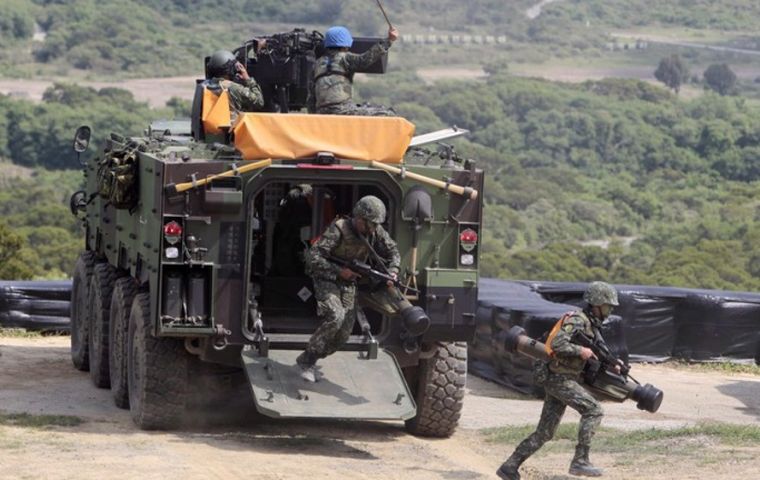MercoPress. South Atlantic News Agency
US to increase military aid to Taiwan
 Tensions between the US and China have grown since House Speaker Nancy Pelosi's trip to Taipei
Tensions between the US and China have grown since House Speaker Nancy Pelosi's trip to Taipei Funding worth more than US$ 1.1 billion has been pledged from the United States to Taiwan, according to Pentagon sources quoted Friday by the press. The measure will help the island strengthen its missile and radar systems, a State Department spokesman also said.
The announcement comes at a time of particular tension over Taiwan with Chinese military maneuvers near the island and after the controversial visit of the Speaker of the US House of Representatives, Nancy Pelosi.
The aid package is the largest ever granted to the country China regards as a rogue province and includes 60 Harpoon-type ship-firing missile systems and 100 AIM-9 Sidewinder short-range missiles, as well as financial support for a radar system. However, the aid has yet to be endorsed by the US Congress, where Taiwan has the support of both Democrats and Republicans, due to which approval seems a mere formality.
The same State Department spokesperson said the military aid was needed for Taiwan to “maintain its ability to defend itself” and recalled that, since 2010, the US government has notified Congress of the delivery of more than US$ 35 billion in military aid to Taiwan. The same source also argued that the aid complied with the “one China” principle whereby the only Chinese government to be recognized by the US is the one based in Beijing.
The United States adopted the Taiwan Relations Act of 1979, in which it pledged to aid the island, although it remains unclear whether it would intervene in the event of a Chinese attack. US President Joseph Biden's administration has never ruled out using force. China considers Taiwan a rebel province since the Kuomintang nationalists retreated there in 1949 after losing the civil war against the communists on the mainland. Taipei also maintains that the People's Republic of China has never ruled the island and has no right to claim it.
The new package was announced in the wake of China's aggressive military drills around Taiwan following a visit to the island last month by US House of Representatives Speaker Nancy Pelosi, the highest-ranking US official to travel to Taipei in years.
Meanwhile, Taiwanese tycoon Robert Tsao, a microchip entrepreneur, announced he would disburse US$ 32 million to train and equip a 3.3 million-strong army of ‘civilian warriors’ to be ready in case of a Chinese attack.
The United Microelectronics Corp founder made this announcement after Taiwan’s defense ministry announced it had shot down a Chinese drone over Taiwan’s Kinmen islands. Tsao, 75, said the Chinese Communist Party (CCP) threat to Taiwan was growing.
“If we can successfully resist China’s ambitions, we not only will be able to safeguard our homeland but make a big contribution to the world situation and the development of civilization,” Tsao said.
Formerly an active supporter of unifying Taiwan with China after the Taiwanese government ordered an investigation of his company, Tsao told Radio Free Asia that he had a change of heart after witnessing the crackdown on Hong Kong’s pro-democracy movement, particularly the Yuen Long MTR attack.
“Given the Chinese Communist party’s record of atrocities against its own people and its brutal domination of those like the Uyghurs who are not even Chinese, the CCP’s threats have only ignited among the Taiwanese people a bitter hatred against this threatening enemy and a shared determination to resist,” he stressed.




Top Comments
Disclaimer & comment rules-

-

-

Read all commentsThere is still no defense for Zircon. China has already received 30 units. Soon you will receive 270 more.
Sep 03rd, 2022 - 01:14 pm 0Best USA does not send large ships to the region. A Zircon is capable of sinking the largest of aircraft carriers.
https://www.youtube.com/watch?v=ix0rBZVAyYE
Brasileiro Exactly !
Sep 03rd, 2022 - 08:27 pm 0They wont be getting any more, any time soon.
Sep 03rd, 2022 - 10:30 pm 0The Russians don’t have them to spare, or anything else for that matter.
Oh, and they can be stopped.
If the Chinese do decide to invade and they are only fighting the Taiwanese, then they can expect to win but with heavy losses.
If the US military engage, then all the Chinese can expect is heavy losses.
‘strategic ambiguity’.
Either way they can expect no support or supplies from the Russians, they are already overstretched.
Commenting for this story is now closed.
If you have a Facebook account, become a fan and comment on our Facebook Page!